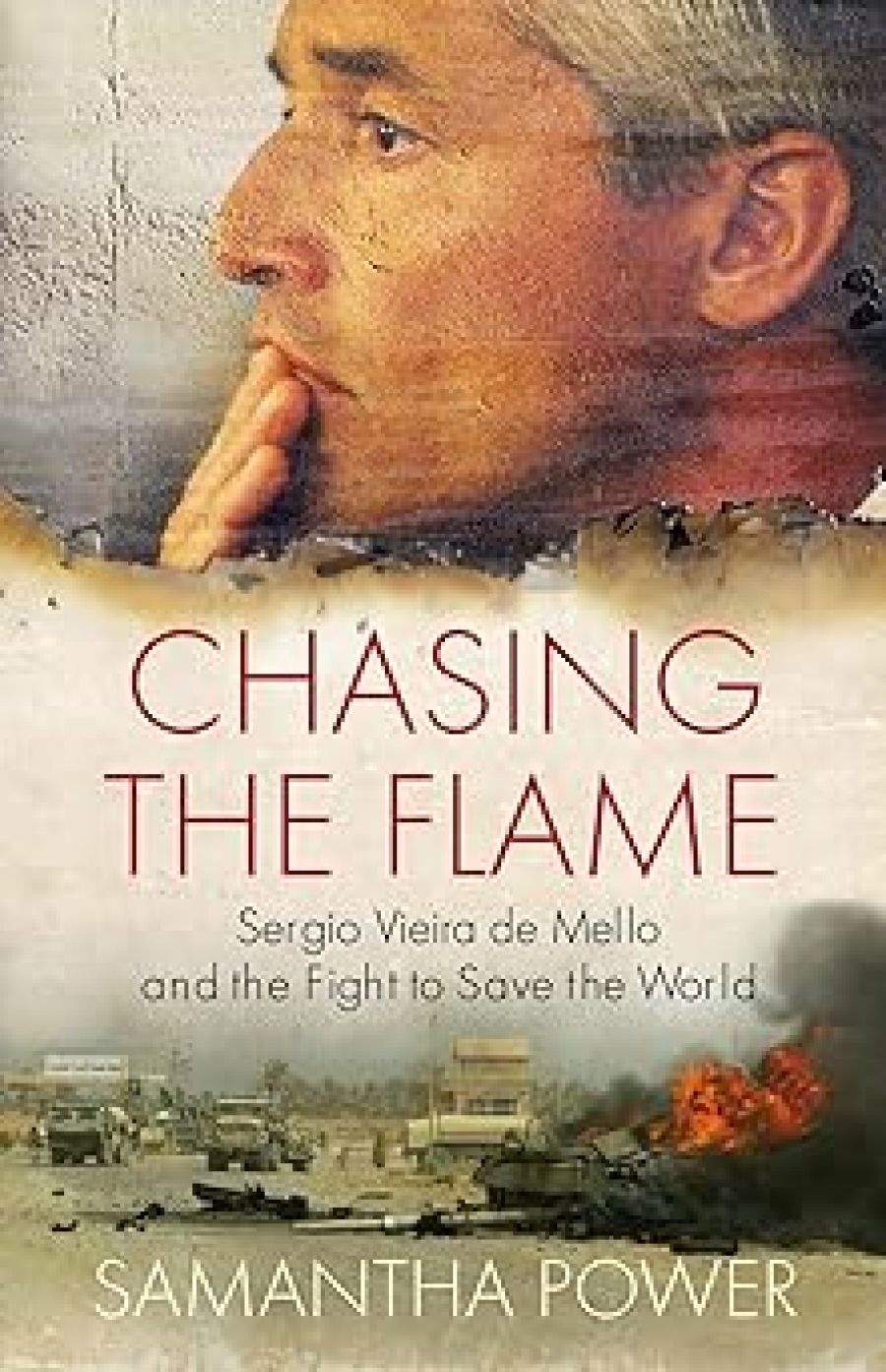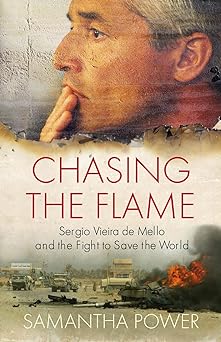
- Free Article: No
- Custom Article Title: The art of black-boxing
- Review Article: Yes
- Article Title: The art of black-boxing
- Online Only: No
- Custom Highlight Text:
This is a heavy book with which to make a leap of faith: to trust that one life can make a difference in the deeply compromised pursuit of international justice and security. In the epilogue to her biography of Sergio Vieira de Mello, Samantha Power suggests ‘if there was anyone who could have wrung from the UN whatever reform and promise it could muster, it was he’. In this long book, depicting some of the worst that humanity can inflict on itself, Power builds this image of Vieira de Mello. If her claim for his significance is justified, then we might indeed revisit the conditions for such faith.
- Book 1 Title: Chasing The Flame
- Book 1 Subtitle: Sergio Vieira De Mello and the fight to save the world
- Book 1 Biblio: Allen Lane, $69.95 hb, 638 pp
- Book 1 Cover Small (400 x 600):

- Book 1 Cover (800 x 1200):

The Brazilian-born Vieira de Mello spent his entire professional life with the United Nations. A student radical in Paris in 1968, he completed a doctorate in philosophy at the Sorbonne and joined the office of the United Nations High Commissioner for Refugees in 1969. Overcoming an early propensity to mime throwing stones at large American cars in Geneva, he soon embraced a few core principles.
His first director, Thomas Jameson, impressed on Vieira de Mello that if there was a way to close a displaced persons’ camp, he should take it. In 1991–93 he consolidated his international reputation as a special envoy in Cambodia through his success in repatriating Montagnards from camps in Thailand to land he had secured through close negotiations with the Khmer Rouge (KR). Considerable personal danger – and some ethical juggling – was involved in building that relationship with the ‘isolated, introverted and pathologically suspicious’ KR leadership. Vieira de Mello coined the term ‘black boxing’: ‘sometimes you have to black box past behaviour and black box future intentions. You just have to take people at their word in the present.’
Processes mattered, especially if they led to the return of more than 360,000 refugees. And if that settlement later broke apart, it was not the KR that betrayed it but Hun Sen, who could not tolerate such accommodation. By then, Vieira de Mello had been moved to Angola, Rwanda and then Bosnia. He was at the front of that late twentieth-century caravan of ‘lowly humanitarians’, as he put it: ‘the guys who pass out food and fix roads’, who were incapable of offering political solutions, only the bare, perhaps transient props for ‘a sense of dignity’. While in Bosnia, his black-boxing included seeking a copy of the New York Review of Books for an article on psychiatry that might interest Radovan Karadžić, just to keep him talking.
Power’s account is in many ways an extended parable. Vieira de Mello is proud, suave, vain and handsome. His reputation preceded him as a cross between James Bond and Robert Kennedy. But he is tested, makes mistakes and learns, and is humbled as his journey unfolds. The young official witnessing Israel’s invasion of Lebanon in 1982 realises how fatuous it is to denounce such conduct as unacceptable. The UN transitional administrator in East Timor perceives that no amount of benevolence will assuage a new nation’s desire to govern itself. Gradually, after a failed marriage and with estranged children, he realises that he must attend to the personal costs of a life of adrenalin and trouble-shooting. Yet, overall, this is not a biography of character, the realization of an individual’s identity: it is a tale of experience and moral awakening, from which Power is keen to draw lessons.
Some of these lessons have a textbook air – legitimacy matters; engage all partners; develop humility and patience – especially given the complexity of Vieira de Mello’s own experience. In such passages, Power can seem too conspicuously the policy adviser to Barack Obama (‘the person whose rigor and compassion bear the closest relationship to Sergio’s that I have ever seen’), keen to point a message to an American readership that must shoulder its superpower burdens (it was on the speaking tour to publicise this book that Power’s unguarded reference to Hillary Clinton as a ‘monster’ led to her losing this much-treasured association with the Obama campaign).
Some passages seem overly dramatic, as with the sudden shift in narrative pace to the fifty pages devoted to 19 August 2003: the day Vieira de Mello, then special representative of the secretary-general in Iraq, was trapped in the rubble of his bombed headquarters, dying slowly because all that could be found to rescue him was a curtain, a curtain drawstring and a woman’s straw handbag. These were the symbols of a UN mission that was both too close to American occupying forces to seem neutral but too distant to be protected, and of the whole disastrously unprepared exercise in ‘nation building’ of which Vieira de Mello himself had come to despair.
But some lessons point to a more accessible, if daunting, path for faith in reform. Not surprisingly, they require us to get closer to Vieira de Mello himself.
Was he ambitious? Probably – his critics usually thought him so, scheming for the top job. But he was also dutiful: he went where he was told by secretaries-general who negotiated a mean calculus of skill and political favour in determining appointments. On the ground, his talents were operational, not bureaucratic, and he gravitated more to a military’s perspective on applied capacity than to the pursuit of ‘rights’ for their own sake. He became adept at bending rules to meet situations at hand. This was probably not the style of leadership expected in New York.
Was he a ‘phoney’? Certainly his appearance and manner were cultivated to suit occasions. Yet ‘Mr Teflon’ had a role to play in maintaining the image, and often illusion, of confidence that UN operations required. Especially for women colleagues, Vieira de Mello provided a sense of reassurance and inclusiveness amid ‘the macho cowboy environment’ of humanitarian work. One of the great strengths of Power’s study is her attention to the personal costs arising from a commitment to such international lives.
Was he principled? As Power insists, Vieira de Mello was a compartmentaliser. He tended to ‘side with power’. This propensity had its ugly sides. The brutality of China’s past, he once remarked, should be forgotten: ‘remembering history will only slow them down.’
But in East Timor – his greatest achievement – he proved quick to learn from mistakes. He saw that the challenges he faced required a fundamental rethinking of UN systems, and the open incorporation of environmental and equality agendas. Australian readers might want a little more detail on the fraught negotiations between the Howard government and East Timor over access to oil resources – a ‘nice little earner’ (so characterised by Alexander Downer), which Australia sought first to keep below the scrutiny of international law, and then conceded with paternalistic ‘generosity’. Power’s allowance that Peter Galbraith – deployed by Vieira de Mello in these negotiations – could be ‘undiplomatic’ in his exchanges with Australian officials would be, from the latter’s perspective, an understatement.
The circumstances of his life mean that Vieira de Mello must retain a certain aura. John Sanderson, the Australian lieutenant general who commanded UN peacekeeping forces in Cambodia and worked closely with him, insists that ‘all the things you have read about him since his death are true’: the compassion, grace and courage. The relentless mobility of his work left little time to enquire what enabled the kinds of interventions with which he was associated, all in the name of a recently created, selective and easily distorted concept of humanitarianism. Power’s book also lacks the distance to ask such questions. But in testing both conscience and cynicism, her account of Vieira de Mello prompts the rethinking of what can be asked of the United Nations, and in whose name.


Comments powered by CComment